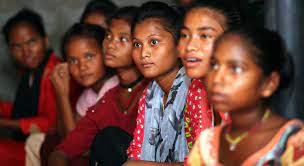
Urgent, and accelerated action is needed to end female genital mutilation, child marriage, and other “harmful practices” and abuses carried out against women and girls, the UN sexual and reproductive health agency (UNFPA), said on Tuesday, in its latest major report on the state of the world’s population.
Every year, millions of girls are subjected to practices that routinely harm them, both physically and emotionally, with the full knowledge and consent of their families, friends and communities, the report states.
“Harmful practices against girls cause profound and lasting trauma, robbing them of their right to reach their full potential”, UNFPA Executive Director Dr. Natalia Kanem said, in a press release.
The State of World Population 2020: Against my will, defying the practices that harm women and girls and undermine equality, highlights at least 19 rites - ranging from breast ironing to virginity testing - which are considered human rights violations.
Focus on three common abuses
The report focuses on the three most prevalent; female genital mutilation, child marriage, and extreme bias against daughters, in favour of sons.
Highlighting that an estimated 4.1 million girls will be subjected to female genital mutilation this year alone, the report also notes that today, 33,000 girls under age 18 will be forced into marriage, usually to much older men.
Also, an extreme and continuing preference for sons over daughters in some countries has fuelled gender-biased sex selection, or extreme neglect, that leads to girls’ death as children, resulting in what amounts to around 140 million “missing females”, the report continues.
Speaking to journalists in Geneva, Monica Ferro, UNFPA Geneva Director, alerted that all these harmful practices are based on the “assumption that the rights and the well-being of women and girls are less of those of men and boys”, resulting in “fewer choices and “putting them under the sexual, economic and legal control of men, which is also a violation of their human rights.”
Respect, protect, fulfil legal obligations
Ms. Ferro pointed that the new data gathered in the report could be summarized in three words: respect, protect and fulfil.
“We must foster respect for women and girls, by changing attitudes and practices”, that commoditize them. “We must protect women and girls by enforcing laws against practices like child marriage and female mutilation, but also by changing attitudes and norms. And governments must fulfil their obligations under human rights treaties”, that require elimination of these practices and rituals, she explained.
According to the report, some practices are waning in countries where they have been most prevalent. But because of population growth, the number of girls subjected to them will actually rise in the coming decades, if urgent action is not taken.
Countries that have ratified international treaties such as the Convention on the Rights of the Child, have a duty to end the harm, whether it’s inflicted on girls by family members, religious communities, health-care providers, commercial enterprises or State institutions themselves.
Many have responded with laws, but laws alone are not enough, the press release added.
Decades of experience and research show that bottom-up, grassroots approaches, are better at bringing change, said UNFPA.
Confronting the silent and endemic crisis
“We must tackle the problem by tackling the root causes, especially gender-biased norms. We must do a better job of supporting communities’ own efforts understand the toll these practices are taking on girls and the benefits that accrue to the whole of society by stopping them”, said Dr. Kanem.
According to the agency, ending child marriage and female genital mutilation worldwide is possible within 10 years, by scaling up efforts to keep girls in school longer and teach them life skills and to engage men and boys in social change.
Investments totalling $3.4 billion a year through 2030 would end these two harmful practices and end the suffering of an estimated 84 million girls.
COVID-19 disruption
While progress has been made in ending some harmful practices worldwide, the COVID-19 pandemic is threatening to reverse gains.
A recent analysis revealed that if services and programmes remain shuttered for six months, an additional 13 million girls may be forced into marriage and 2 million more girls may be subjected to female genital mutilation between now and 2030.
“The pandemic both makes our job harder and more urgent as so many more girls are now at risk”, Dr. Kanem concluded: “We will not stop until the rights, choices and bodies of all girls are fully their own.”
In Geneva, Ms. Ferro added that in order to get to zero, action is needed to be taken much faster. “We can’t stop until we get to zero, and we can’t let the COVID-19 pandemic get in our way”.
Source: UN News
https://news.un.org/en/story/2020/06/1067382
 FR
FR EN
EN AR
AR








